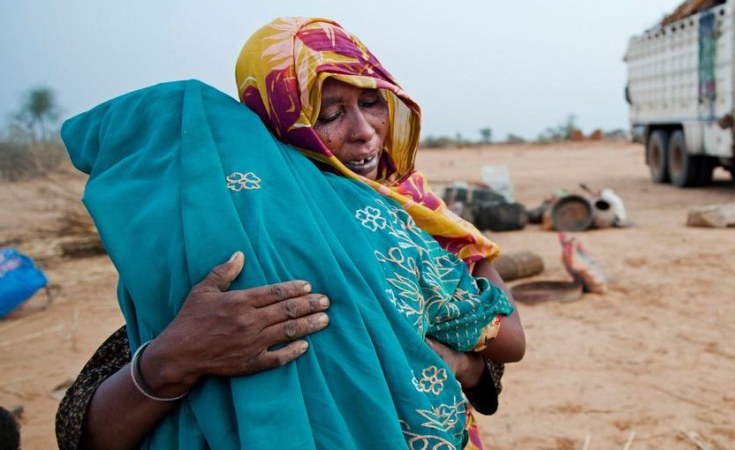Last year marked the highest level of conflict-related internal displacement ever recorded in the world, with 68.3 million people--with Sudan contributing the highest percentage to this record, according to a new report from the Internal Displacement Monitoring Centre (IDMC).
Fighting between the Sudanese Armed Forces and the paramilitary Rapid Support Forces (RSF) erupted on 15 April 2023, triggering mass displacement totaling 9.1 million people by the end of 2023--the most ever recorded in a single country since records began in 2008. A staggering 20% of Sudan's population is currently internally displaced.
Khartoum, Al-Jazeera
Nearly two-thirds of these estimates come from the capital area, Khartoum State, where over 39% of inhabitants fled, sometimes leaving entire neighbourhoods empty. "You cannot believe it, once bustling streets are now empty, void of life," said Amira Osman, a former Omdurman resident, Khartoum's sister city. Last year, Amira Osman fled her neighbourhood in what is called "old Omdurman", after heavy shelling destroyed many of the homes on her street. She had returned recently to collect what few belongings remained in her home, only to find the place in ruins. "There is nothing here now--this war has brought everyone and everything to zero," Osman told Ayin. Even the once bustling Omdurman market, once considered one of the largest markets in Africa, is now dormant and impossible to visit.
For many of those forced to flee Khartoum, it was their first time experiencing displacement, local residents told Ayin. Many of those who fled the capital area early on during the war, however, soon experienced displacement again after relocating to Al-Jazeera State. In December, the Rapid Support Forces invaded Wad Medani, the capital of Al-Jazeera State, compelling 327,000 people to flee the area. Sara Abbass* used to be a pharmacist and lived in Wad Medani with her family, but fled the area after the RSF invaded the city last December. "We had to flee Wad Medani for our safety because the RSF took control over the majority of the state," she told Ayin. "At first, we fled to a small village in eastern Al-Jazeera State, but we didn't feel safe there, so my family and I decided to leave the state entirely and relocate to Atbara." Wad Medani had become a medical hub for diverse treatments after Khartoum fell, Sara added, but most medical personnel fled the area, and the RSF and aligned militias looted most medical supplies and equipment in the city.
Darfur
It did not take long for the conflict to spread to restive Darfur, where the remaining displacements in 2023 were reported. Deadly attacks primarily targeting the Masalit community in West Darfur State endured the highest level of confict displacement along with the highest rate of acute food insecurity. "In May, there were long lines of people just leaving Geneina (the capital of West Darfur State), heading to Chad," said Juma Dawood, now displaced in the sprawling Adré Refugee Camp in Chad. "If they thought you were Masalit, they would shoot you; no one could remain." Somia Musa used to reside in a village near Geneina but fled after armed men raided her village. "They took everything, and what they could not carry, they burned," she told Ayin. "We were left with nothing and had no choice but to leave."
More recent cases of displacement are taking place in the El-Fasher area, the capital of North Darfur State, as violent clashes on 10 and 11 May have displaced an estimated 850 people. Since the war started, roughly 570,000 people have been displaced in North Darfur State, with over a third of these hosted in the El-Fasher locality, the UN reported. The fighting has now trapped many displaced people in El-Fasher, keeping them in the middle of the conflict. "The current encirclement of El Fasher and the camps means suffering and death for an untold number of civilians, particularly the most vulnerable: children," said Nathaniel Raymond, the Executive Director of the Humanitarian Research Lab at the Yale School of Public Health.
Children
Conflict and food insecurity have taken a significant toll on internally displaced children, the report said. As of November, the malnutrition rate among children under five in Sudan was the highest in the world, and Sudan was considered the largest child displacement situation globally, with an estimated 7,600 children forced to flee daily. With many education facilities closed, 19 million children had lost access to education and were left vulnerable to recruitment by armed groups.
Unaware of the reality of warfare and displacement, children are particularly prone to post-traumatic stress disorder, says psychiatrist and researcher in children's affairs, Marwa Muhammad Ibrahim. "Adults perceptions of war differ from those of children, which makes the psychological impact on children more difficult. The reality that Sudanese children are experiencing is tragic in every sense of the word," she said. Marwa Muhammad suggests children need to be placed in a safe, child-friendly environment in order to recover from conflict-related trauma.
Naturally, she adds, the best solution to help Sudanese children recover would be for the war to end altogether. Youssef Jai, the Senior Policy Advisor to the Internal Displacement Monitoring Centre, agrees. "Sudan is a neglected crisis; I think humanitarian funding is very low, which makes the resolution of the conflict even more urgent and imperative, so I hope the guns will go silent soon."
* Last name was changed to hide her identity for security purposes


